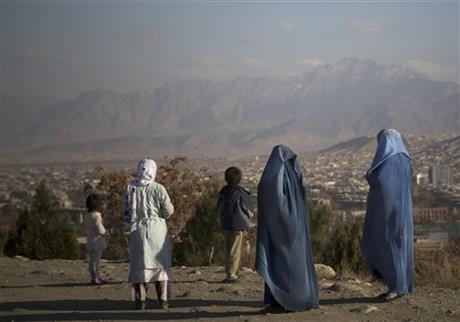
By PATRICK QUINN
Afghan women with their children enjoy a view over Kabul, Afghanistan, Monday, Nov. 25, 2013. Human Rights Watch says that the Afghan government should reject a proposal to reintroduce public stoning as a punishment for adultery, but the Justice Ministry says such a law has not yet been sent for review as part of a new penal code that is still being drafted. When the Taliban where in power from 1996 to 200, convicted adulterers were routinely shot or stoned in executions held mostly on Fridays. Women were not permitted to go out on their own, girls were barred from schools and men were obliged to grow long beards.(AP Photo/Anja Niedringhaus)
KABUL, Afghanistan (AP) — Human Rights Watch called Monday on the Afghan government to reject a proposal to reintroduce public stoning as a punishment for adultery, but the Justice Ministry denied that such a law had been submitted.
The human rights organization said that a working group led by the Justice Ministry that is assisting in drafting Afghanistan’s new penal code had proposed provisions on ‘moral crimes’ involving sex outside of marriage that call for stoning.
“International donors, including those supporting the legal reform process, should send a clear message to President Hamid Karzai that inclusion of stoning in the new penal code would have an immediate adverse effect on funding for the government,” the group said.
But Mohammad Ashraf Azimi, the head of the Justice Ministry’s punishment laws department, said such a proposal had not yet been submitted for review.
“As a member of the department for the punishment laws, I haven’t seen this part of the law they are mentioning,” he said. “I don’t know where they found it and why they are emphasizing it. We are the people working on it and we haven’t seen it.”
He said at least two more years are needed to complete the new penal code, intended to replace one in effect since 1976. He said international organizations were heavily involved in the process, which began two years ago.
Azimi said one working group was dealing with Islamic Shariah law because Afghanistan is an Islamic republic. That group, he said, was drafting various proposals for issues such as adultery, which currently is a crime in Afghanistan punishable with up to 15 years imprisonment.
Stoning was used as a punishment for adultery during the Taliban government, which ruled for from the mid-1990s until late 2001, when they were overthrown by the American invasion.
Azimi’s remarks came as Afghanistan’s Interior Ministry ordered an investigation Monday into the case of a couple allegedly shot by their relatives for adultery. The killing, said to have taken place in a Taliban-dominated area of northern Baglan province on Saturday, was based on what the ministry described as an illegal decision taken by tribal elders.
Such so-called honor killings are common in Afghanistan’s highly conservative Islamic society, particularly in areas controlled by the Taliban.
According to Khadija Akhil, provincial head of women’s affairs, a 28-year-old man and 25-year-old woman, who were both married to other people, fled the village of Joye Naw but their car broke down.
“They were caught and when police went to the area the villagers said they were punished according to our culture,” she said.
Akhil said the villagers were originally going to stone them, but shot them instead. She added that they then gouged out the man’s eyes and hacked his body with knives.
Mohammad Mahmoud Haqmal, spokesman for Baghlan’s governor, said they were shot by the woman’s father.
The ministry said police have been ordered to arrest those responsible.



